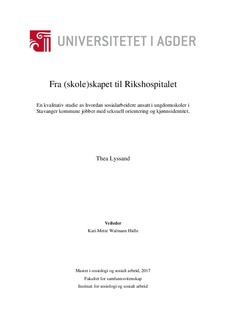| dc.contributor.author | Lyssand, Thea | |
| dc.date.accessioned | 2017-09-25T12:45:11Z | |
| dc.date.available | 2017-09-25T12:45:11Z | |
| dc.date.issued | 2017 | |
| dc.identifier.uri | http://hdl.handle.net/11250/2456567 | |
| dc.description | Masteroppgave Sosiologi og sosialt arbeid ME522 - Universitetet i Agder 2017 | nb_NO |
| dc.description.abstract | This master thesis is a qualitative study on how social workers working in secondary schools in Stavanger municipality works with sexual orientation and gender identity. The study is based on interviews with 11 university and college educated social workers, child welfare officers and social educators employed at 8 different secondary schools in Stavanger. The thesis is structured around three research questions: 1) What role does the social worker have in the school? 2) What knowledge and competence does the social worker have of sexual orientation and gender identity? And 3) How does the social worker work with sexual orientation and gender identity in the school? The data has been analyzed and discussed based on theory on the subject.
The social worker’s role seems unclear and poorly rooted. Although the social worker has the freedom to adapt their work according to the student’s needs, their role seems confusing both to the students and the social worker. Other employees expect the social worker to handle the social aspect of the school and the student’s wellbeing. It is expected that they follow up, cooperate with parents and other agencies, and should be available for the students. The students expect to be able to trust the social worker and that she/he is there for them. In some cases, the social worker’s unclear role leads to them taking on responsibilities that they do not have the needed knowledge or competence for.
Sexual orientation and gender identity is not a part of the social worker’s education, and almost none of the informants have received any more training through the school. Most of them acquire knowledge and competence on the subject themselves, largely from reprehensible sources like TV-shows and websites.
The social workers work with sexual orientation and gender identity varies. At most of the schools the students rarely go to the social worker to talk about these subjects on their own initiative. These are subject that are more often brought up when the students have a closer relationship with the social worker. This kind of individual work with students is largely based on follow-up and help related to coming-out-processes and gender confirming
4
treatments. Several of the schools also offer groups where the students can talk about sexual orientation and/or gender identity if they want.
The student body as a whole is rarely informed that they can talk to the social worker about sexual orientation and gender identity. It seems that sexual orientation and gender identity still are considered private and personal, and that there is still stigma attached to these subjects. There is also a lack of projects that deal with the subjects alone or that the whole study body gets to attend. Some schools use lecturers to inform all of the students and the employees on the subject, and the student council and some employees at several schools attend the "Eg e den eg e!"-conference.
The social workers claim that there is little gender related bullying in the schools, which is not consistent with earlier research. This gives cause for concern if the bullying is hidden from the adults at the school, or if the social workers does not regard it as serious enough to mention in the interviews.
A lot of the informants claim that they can do more work related to the subjects if they see a need for it in the school. I am critical of whether or not the social worker should base the student’s need on only the students that are out of the closet. I claim that it is the students that are not open about their sexual orientation and/or gender identity that may need these subjects talked about in school. On the other hand, I am encouraged by the fact that a number of informants seem motivated to work more with these subjects and that the participation in this project has contributed to this. | nb_NO |
| dc.language.iso | nob | nb_NO |
| dc.publisher | Universitetet i Agder ; University of Agder | nb_NO |
| dc.rights | Attribution-NonCommercial-NoDerivatives 4.0 Internasjonal | * |
| dc.rights.uri | http://creativecommons.org/licenses/by-nc-nd/4.0/deed.no | * |
| dc.subject | ME522 | nb_NO |
| dc.title | Fra (skole)skapet til Rikshospitalet: En kvalitativ studie av hvordan sosialarbeidere ansatt i ungdomsskoler i Stavanger kommune jobber med seksuell orientering og kjønnsidentitet | nb_NO |
| dc.type | Master thesis | nb_NO |
| dc.subject.nsi | VDP::Samfunnsvitenskap: 200::Sosialt arbeid: 360 | nb_NO |
| dc.source.pagenumber | 108 s. | nb_NO |

